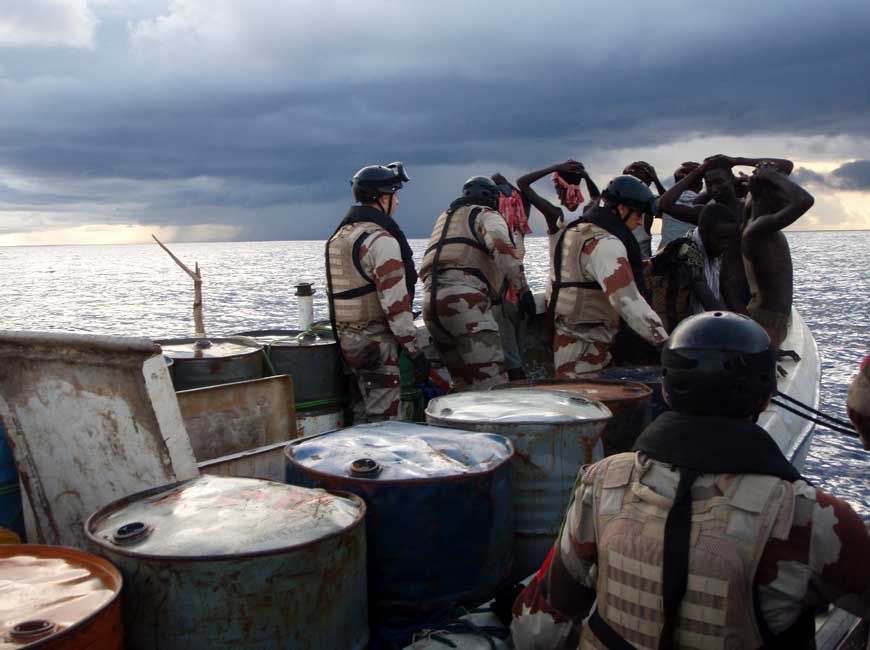First offensive action of EU anti-piracy forces on the Somali coast (maj2)

(BRUXELLES2) The European forces did not linger. As soon as the Bundestag approved the new offensive mandate for the European anti-piracy operation (confirmed on May 10), the sailors of Eunavfor Atalanta carried out tonight an operation to destroy pirate stocks on the Somali coast, near the town of Haredhere, one of the most famous pirate landmarks, located in Galmudug according to our information.
Target hit by air
« The target, precise and proportionate, was hit from the airways “We say at Atalanta HQ, probably by helicopter. " And all the forces returned safe and sound to the ships, once the action was over. ". The rating is " projects " But " surveillance of the area during the action indicates that no Somalis were injured on the ground during this European Union action ". The operation was " conducted in full compliance with UN Security Council Resolution 1851 and with the full support of the Transitional Federal Government of Somalia we specify.
The nationality of the resources involved was not specified. It is " european means I was told. And all the military representatives of each nation involved in the operation have given their agreement. The hypothesis of a commitment of "tricolor" (French) means could be mentioned for a moment. But it would be, in fact, according to our information, a Spanish helicopter which would have been engaged.
Several skiffs destroyed
According to details B2 obtained from officers involved in the operation, " Several skiffs were destroyed », during this operation effectively involving "one helicopter" which took place shortly before midnight. A maritime patrol aircraft flew over the area in support and reconnaissance. It is a " clear gesture marking our determination explained to me an interlocutor. “Other actions could be carried out in the short term if necessary”. A dozen deposits have already been identified. Some are easily moved, others much less so. Because they are anchored under ships held hostage. But the mere fact that pirates move their camps is already disrupting their activity.
Increase pressure on pirates, prevent them from going to sea
This is the lesson learned by Rear Admiral Duncan Potts, head of Operation Eunavfor Atalanta. " This measure will further increase the pressure on pirates, disrupt their activity and prevent them from going to sea to attack merchant ships and dhows.. "" Local people and Somali fishermen, many of whom have suffered so much from piracy in the region, can rest assured that our focus is on known pirate gear and will remain so in the future. ". he added, keen to reassure the local populations and fishermen, worried about this new attitude of the anti-piracy forces. " At no time did the European naval force have a presence on the ground” ( 'boots' go ashore). NB: the European Eunavfor force currently comprises 9 ships and 5 aircraft over a vast area covering the entire Indian Ocean from the Arabian Sea to the Mozambique Channel, passing through the Gulf of Aden and the Somali basin.
Comment: a European first and a serious warning to pirates
It can be specified that this direct offensive action is a first not only at the level of the anti-piracy operation but also of the European Union's peacekeeping operations which hitherto only responded in the event of self-defence.
It is also a serious warning to hackers who are caught between two or three fronts. On land, the Amisom offensive upsets small local arrangements with Al Shabaab officials. While the forces of Puntland try to organize themselves in terms of coastal policing. At sea, the reinforcement of naval and air resources as well as better coordination of forces and more targeted tactics make their action more difficult. Several mother ships have recently been taken over by anti-piracy forces (Eunavfor, NATO, CTF 151). As a result, intense pirate productivity in recent years has seriously slowed since the start of the year, even as we entered the inter-monsoon normally more conducive to pirate outings. Fewer boats = less ransoms, therefore less resources available and less local attractiveness. And now, it is on the beaches that they risk being affected.
Read also:




Comments closed.